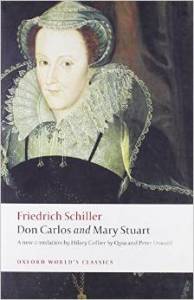Two fisted play reading today–Goethe.s Egmont in my left hand and Schiller.s Don Carlos in my right hand! Who would have thought? It.s a strange coincidence that brings them together. I.m writing on psychological errors or slips that lead to unexpected outcomes in Paying Melpomene’s Price: Risk and Reward on the Tragic Stage (at least that.s the name of the book today, the title changes daily!). It so happens that Posa.s slip and Alba.s slip had been classified together as the type of error that results when we use the ‘if I were you, I would do this’ mental construction. What happens is that Posa thinks he understand Carlos because ‘if I were Carlos, surely I would do this…’ and Alba thinks he understands Orange because ‘if I were Orange, surely I would do this…’. Of course, Carlos and Orange both behave contrary to expectation because Posa is not Carlos and Alba is not Orange. And so Posa and Alba.s strategy turns into tragedy. But that.s not what I.d like to share with you, diligent reader today. What I.d like to share is the striking similarity of subject and perspective in Egmont and Don Carlos. It really is striking. I hit myself for never noticing it before. But sometimes, it.s hard to raise things above the conscious threshold unless it.s really right there in front of your nose. Which is–by good ol’ good luck–the case today.
You may know that Goethe and Schiller were the best of friends. A bromance of genius. Not only that, it was an artistically fruitful union. They exchanged notes and encouraged one another. They were also joint editors of a literary journal founded by Schiller, Die Horen. Contributors included Schlegel, Herder, and the von Humboldt brothers. They corresponded with quite an exalted crowd. Lots was going on. So, at first, I had thought that the parallels between Egmont and Don Carlos were naturally due to their many discussions and correspondences. Wrong. Schiller premiered Don Carlos in 1787 and Goethe finished Egmont the following year. It was only after Goethe had finished Egmont that they met for the first time. And it would have to wait to the next decade before they would begin their friendship in earnest. It.s sure inconvenient when the data undermines our expectations, isn.t it? But, one can see from the parallels why they would become friends. So, ‘what are the parallels’, you ask? Well, dear reader, here they are!
First there is the subject matter. The Beeldenstorm or Iconoclastic Fury was raging through the Low Countries. Here.s what it looked like:
or,
 The Protestant Reformation was in full swing. Protestants–and, if riots were anything like the ones today, trouble making bums–were going around abusing Catholic images and ransacking cathedrals. This did not please Philip II of Spain, who was bringing together the forces of the Counter-Reformation. This is the point of contact between the two plays. While Don Carlos ends on the April day before Alba is dispatched to quell the Beeldenstorm raging through the Low Countries, by a happy coincidence Egmont begins with Alba fast approaching Brussels on an August morning.
The Protestant Reformation was in full swing. Protestants–and, if riots were anything like the ones today, trouble making bums–were going around abusing Catholic images and ransacking cathedrals. This did not please Philip II of Spain, who was bringing together the forces of the Counter-Reformation. This is the point of contact between the two plays. While Don Carlos ends on the April day before Alba is dispatched to quell the Beeldenstorm raging through the Low Countries, by a happy coincidence Egmont begins with Alba fast approaching Brussels on an August morning.
The brotherhood of man, the price the oppressor pays to maintain the status quo, and the price the liberator pays to lift off the oppressive yoke: both playwrights use the Beeldenstorm as a launching point into similar themes. Not only that, they achieve a unity of thought. There is a dawning brotherhood of man that transcends religion and nationality, even though its moment only arrives the day after tomorrow: the old guard represented by Philip in Don Carlos and Alba in Egmont yet rail against the dying light. There is also a price that the oppressor must pay to maintain the status quo, and that price is the bond between the father, steeped in tradition, and the son, who feels the animal spirits of innovation. In Don Carlos, father sacrifices son to the Inquisition. In Egmont, Alba triumphs over Egmont, but not before Egmont passes the torch of Enlightenment onto Ferdinand, Alba.s son. Finally, there is in both plays a bittersweet ending for the heroes who die in uncertainty of the outcome and are only vouchsafed a posthumous day of celebration. How.s that for uncanny parallels in two independently written plays which were concurrently written?
I wonder how much their similar worldviews, or, I should say rather, Weltanschauungen, contributed to their friendship? It.s good that it did, because, if I remember correctly, it was Schiller who prodded Goethe to take up and finish the monumental second part of Faust. Goethe had relegated the work to the scraps bin because, well, it was just too monumental: the marriage of Classicism and Romanticism, the journey of a man over an entire life, the struggle for redemption. And, of course, the almighty and all mystical Ewig-Weibliche or eternal-feminine that is called to save Faust at the last second. Just thinking about how dedicated Goethe and Schiller were to Doing Melpomene.s Work gives me the goosebumps. Remember, Goethe was also a full-time politician and scientist as well! So with that thought, until next time, I am Edwin Wong and I am doing my part in Doing Melpomene.s Work.


